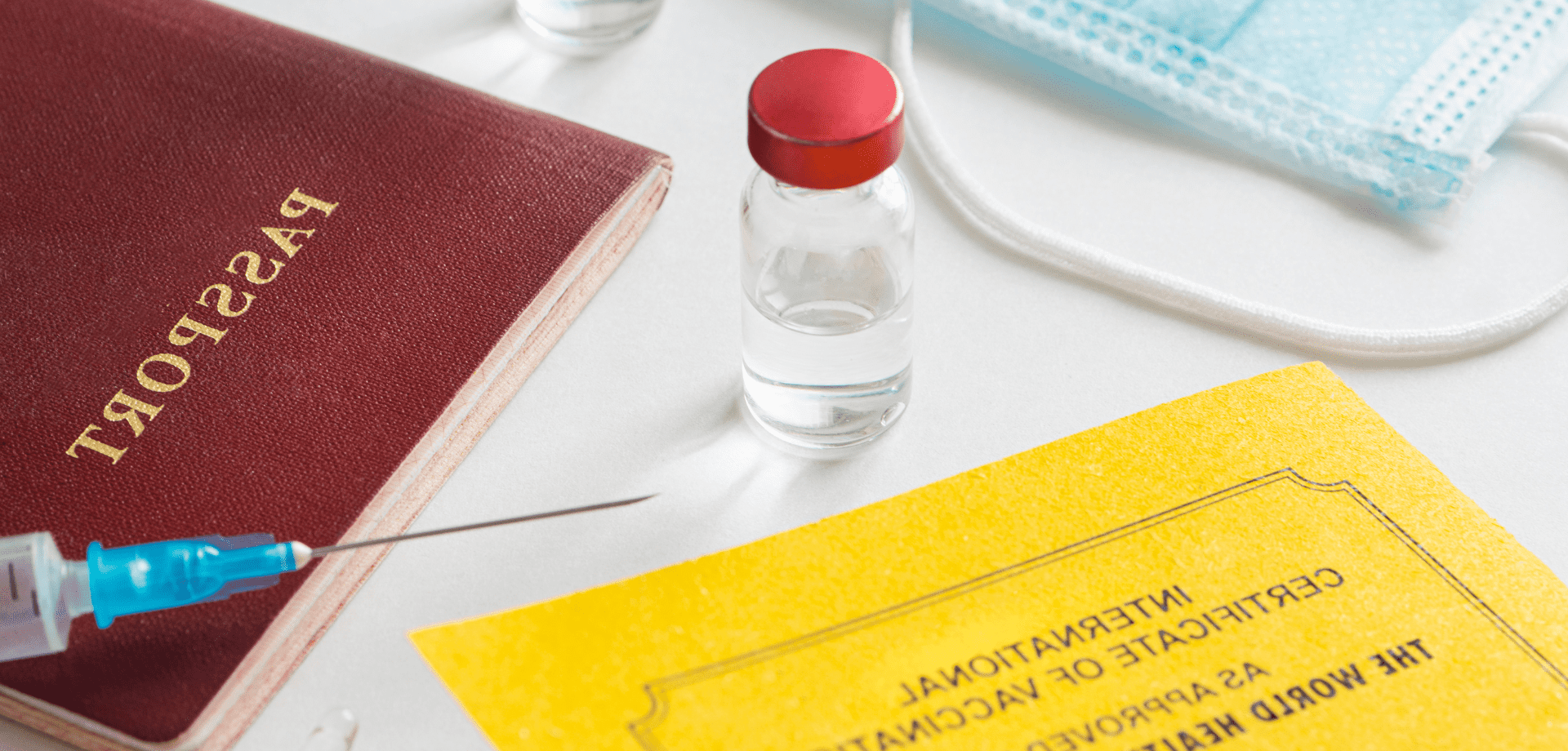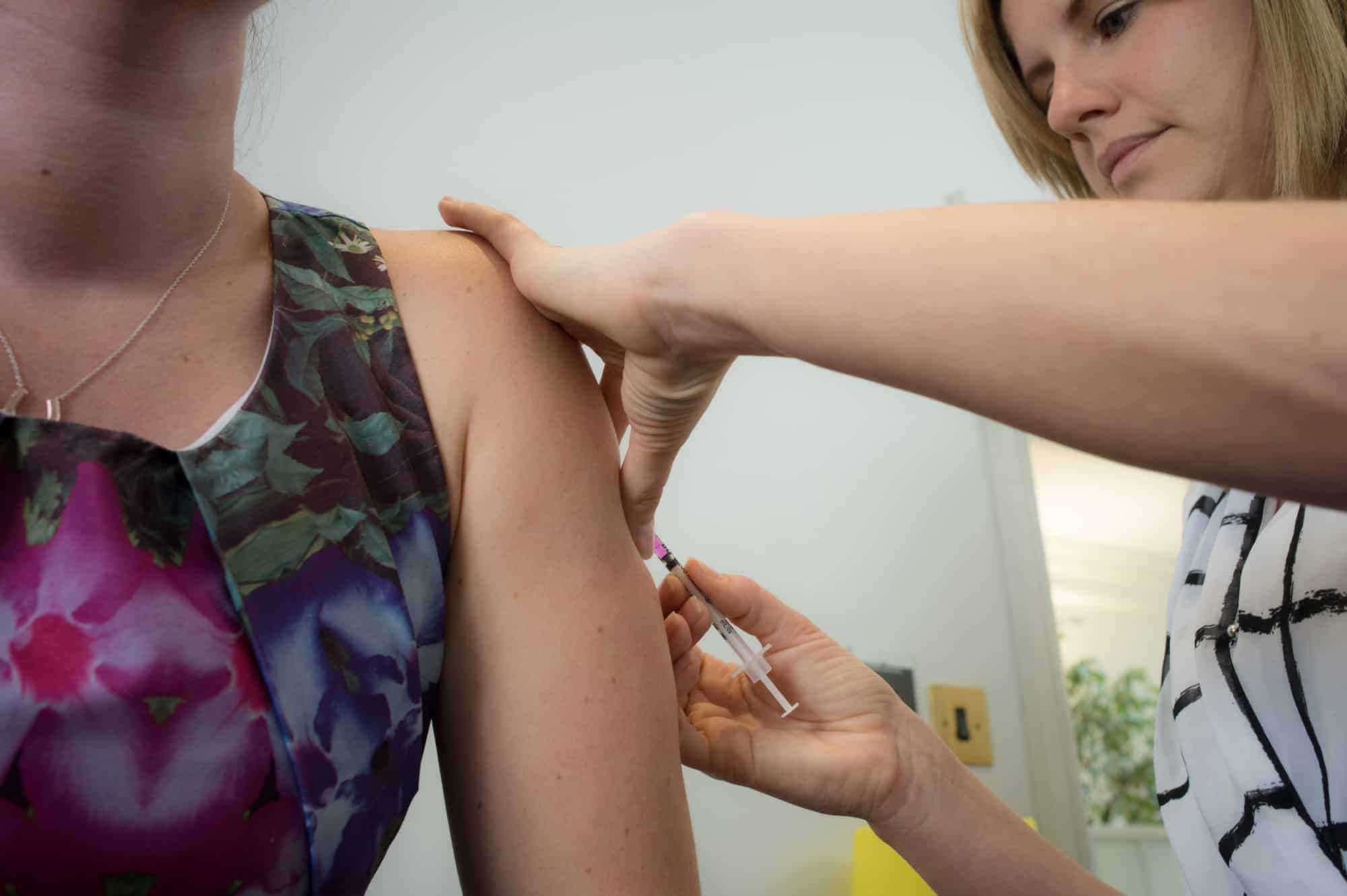Tag: vaccine
ESSENTIAL CHICKENPOX VACCINE FACTS:
- The chickenpox vaccine is not currently given by the NHS, but is part of the childhood vaccination schedule in other countries
- Chickenpox is a highly contagious infection caused by the varicella zoster virus
- In the UK, it mostly affects children
- It can be itchy and uncomfortable, can leave scars, and can sometimes cause severe disease – adults may suffer more serious symptoms, including pneumonia
- Chickenpox is spread by inhaling droplets coughed up by people infected with the virus
- People with chickenpox become contagious about 2 days before the appearance of the rash, which can make it difficult to avoid infection
- The chickenpox vaccine (varicella vaccine) can be administered from the age of twelve months onwards
- Two doses of vaccine are needed, with a 4 week gap between doses
- If your child is receiving the MMR vaccination or a Yellow Fever vaccine, the varicella vaccination must either be given on the same day, or 4 weeks later
HOW TO BOOK A VACCINATION APPOINTMENT
Fleet Street Clinic is dedicated to maintaining a good supply of the chickenpox vaccine.
Our private chickenpox vaccine service is undertaken by doctors and nurses with long experience of vaccinating children. Our family friendly clinic is sympathetic to parents’ needs and concerns, and we welcome any vaccine-related queries. We operate a Saturday vaccination clinic once a month, the next will be held on Saturday April 8th.
To book your chickenpox vaccination for yourself or your child, you can book online now.
Yellow Fever Update:
Recent news reports have raised concerns about yellow fever vaccine safety. It is important to understand the risks and benefits.
For decades, the yellow fever vaccine was considered to be extremely safe. More recently, however, we have become aware of a low rate of serious adverse effects occurring when older travellers are vaccinated for the first time. The two main types of adverse effects are called YEL-AVD and YEL-AND – the first involves damage to organs such as the liver, and the second damages the nervous system. Yellow fever vaccines contain live viruses that do not harm people with a normally functioning immune system but do seem to cause harm in a tiny proportion of people with an ageing immune system, as well as those with reduced immunity from other causes.
In one of the largest medical studies of yellow fever vaccine safety, the rate of YEL-AND in people aged 60-69 was 2.5 per 100,000 people vaccinated, and in over 70s was 1.6 per 100,000. For YEL-AND, the rates were zero and 4.0 per 100,000 respectively.
According to the US Centers for Disease Control, in the absence of a yellow fever outbreak, the “background” risk of yellow fever occurring in unvaccinated travellers on a 2-week trip to a zone where yellow fever is present is calculated to be:
- West Africa: 50 cases per 100,000, with 10 deaths per 100,000
- South America: 5 cases per 100,000, with 1 death per 100,000
Yellow fever vaccinating centres normally explain these risks to everyone they vaccinate, and in particular to travellers aged over 60. Vaccination for personal protection is recommended where benefit outweighs the risks, and a medical waiver is given when it is not safe for the vaccine to be used. Age alone is not a reason for issuing a waiver.
Other factors that complicate the picture include the following:
- There are active outbreaks of yellow fever in several parts of the world, notably at present in Brazil as well as in several African countries, so the risk to travellers is often much higher than that quoted above.
- Vaccination is the only way to prevent and control yellow fever and is often the only possible public health measure for entire populations.
- Many countries therefore rigorously enforce vaccine requirements as a condition of entry.
- Yellow fever vaccine shortages are common – there is currently a serious shortage in the USA, and the vaccine is not always available when needed.
- Awareness of vaccine risks has come with a stricter approach to recommending vaccine only when travellers are definitely going to be at risk; however, an unintended consequence of this has been to delay the opportunity to vaccinate travellers for the first time until they are older and at greater risk of adverse effects.
The World Health Organization now considers vaccine protection to be life-long, though border officials in several countries do not always recognise this. A small number of recent cases of yellow fever in Brazil among people who had been vaccinated previously has raised further doubt about this policy, and Brazil currently recommends revaccination every 10 years. Revaccination has not been linked to adverse effects.
There is currently extensive UK press coverage (that has also been picked up in the US) of YF vaccine adverse effects – one death occurred shortly after vaccination in a distinguished cancer researcher, and a psychotic reaction in a former BBC journalist vaccinated in Greece. Both cases were attributed to the vaccine because of the timing. Further clinical details are not available, so we can’t yet be certain of a direct link, but this news will undoubtedly have a considerable impact on public perception of the vaccine.
Written by: Richard Dawood, Medical Director and specialist in travel medicine
Book your yellow fever vaccination today.
Links:
- Cancer pioneer Martin Gore’s sudden death from routine jab – Source: The Times
- I had a yellow fever jab, then the voices told me: ‘Kill! Kill! Kill!” – Source: The Times
What is HPV?
Human Papillomavirus, or HPV, is the name of a group of viruses with around 200 different types, that is most commonly passed on via genital contact.
Although HPV is highly common, 90% of HPV infections go away by themselves and do not cause any harm. Most people with HPV never develop symptoms or health problems.
However, it is possible for HPV infections to persist and cause cellular change in your body. This can lead to:
- Cancer of the cervix, vulva, and vagina in women
- Precancerous lesions in men and women
- Genital warts in men and women
- Head and neck cancers in men and women
HPV vaccines have a well-established role in preventing cervical cancers as well as these other aforementioned conditions.
Who Should Be Vaccinated against HPV?
In theory, HPV vaccines are best given to young people before they become sexually active, and therefore before they can be exposed to HPV.
Individuals who are already sexually active might also benefit as they may not have yet acquired all of the HPV strains covered by the vaccine. Patients aged under 16 can only be vaccinated with their parents present.
Why Boys should receive the HPV Vaccine
- About 15% of UK girls who are eligible for vaccination are currently not receiving both doses. This figure is much higher in some areas
- Most older women in the UK have not had the HPV vaccination
- Men may have sex with women from other countries which have no vaccination programme
- Men who have sex with men are not protected by the girls’ programme
- The cost of treating HPV-related diseases is high: treating anogenital warts alone in the UK is estimated to cost £58 million a year, while the additional cost of vaccinating boys has been estimated to cost about £20 million a year
Source: HPV Action
To book an HPV vaccination for yourself or your child, you can book an appointment online. Or find out more information about HPV here.
MUMPS OUTBREAKS IN UK UNIVERSITIES:
CASES OF MUMPS REPORTED AT A NUMBER OF UK UNIVERSITIES
Public Health England has confirmed they are urging students to get MMR vaccinations.
A number of cases of mumps have been reported in Nottingham and Exeter. The recent rise in teenagers and young adults who have not had two doses of the MMR vaccine are believed to have caused an increase in UK cases. Unprotected students are particularly vulnerable due to close living conditions. Students are being urged to ensure they have received the full two-dose MMR vaccine course to protect themselves against mumps.
A total of 241 suspected cases were reported, with 52 confirmed, across Nottingham Trent University and the University of Nottingham and 7 confirmed cases at Exeter University.
MUMPS VIRUS
Mumps is a contagious viral infection which causes swelling of the parotid glands.
Initial symptoms can be similar to a cold and include:
- Headache
- High Temperature
- Joint Pain
- Feeling Sick
- Tiredness
- Loss of Appetite
- Swelling of the face/neck
Mumps can result in some serious complications. It can cause temporary hearing loss in 1 in 20 people. Mumps can cause a rare but potential risk of encephalitis, which affects 1 in 1,000 sufferers and requires hospitalisation.
It is spread in the same way as colds and flu – through infected droplets of saliva that can be inhaled or picked up from surfaces and transferred into the mouth or nose.
A person is most contagious a few days before the symptoms develop and for a few days afterwards.
Some people suffer complications that can include inflammation of the pancreas, viral meningitis (inflammation of the brain), inflamed and swollen testicles in men and ovaries in women.
MEDICAL ADVICE FOR MUMPS
If you think you may be suffering from mumps, or are concerned about the risk of infection, please see your doctor straight away.
Those who have not had the MMR vaccine – or have only received one dose – regardless of age, should ensure they receive two doses of the MMR (measles, mumps and rubella) vaccine.
In order to keep virus’ such as mumps from spreading, a certain proportion of the population must be immunised, this is called the ‘herd immunity’.
Herd immunity is particularly important as not everyone can get vaccinated, but those who can are able to help people those who can’t. Some people are unable to get vaccinated because they’re too ill, too young or have an impaired immune system. When we vaccinate, we protect not only ourselves but also the most vulnerable members of our communities.
VACCINATION AGAINST MUMPS
The disease can be easily prevented with two doses of the MMR vaccine, that has safely and efficiently been in use since the late 1980s’.
Make sure you are up-to-date with your measles, mumps and rubella (MMR) vaccine. Although the NHS immunisation schedule offers the vaccine to children from 12 months of age, the MMR can be given from 6 months. If you have not had measles, mumps or rubella or if you have not had two doses of MMR, you may be at risk. Measles mumps and rubella are easily passed from person to person and can be a serious illness in adults as well as children. It is never too late to have the vaccine.
You can book an MMR vaccine online.
Links:
At present, there is currently a shortage of Hepatitis B vaccine available in the United Kingdom and across the world.
Despite current global shortages, Fleet Street Clinic maintains good stock levels of the Hepatitis B vaccine.
The Hepatitis B virus is one of the most prevalent blood-borne viruses worldwide and is a major cause of chronic liver disease and liver cancer. In the majority of cases, Hepatitis B is asymptomatic – without symptoms. It is easily preventable through vaccination, and we strongly believe this vaccine should be offered more widely – all young, sexually active adults ought to be protected.
Although the overall risk for travellers is low, Hepatitis B immunisation is recommended for travellers travelling to East Asia and Sub Saharan Africa where between 5 – 10 % of the adult population is estimated to have persistent Hepatitis B infection. High rates of infection are also found in the Amazon, southern parts of eastern and central Europe, the Middle East and Indian subcontinents. The risk understandable increases for long-stay travellers in high-risk areas.
Certain behaviours and activities put individuals at higher risk, such as unprotected sex, adventure sports, body piercing, tattoos and injected drug usage.
Receiving medical or dental care in high-risk countries will also increase your risk and it is advised to avoid unless absolutely necessary. Travellers who have pre-existing conditions which may make it more likely for them to need medical attention should definitely consider the Hepatitis vaccination prior to travelling.
Shringrix now in stock
We are pleased to say we have secured a limited stock of Shingrix at Fleet Street Clinic. These are the first doses to become available in the UK and have been specifically imported from other EU markets.
Globally, this vaccine is in extremely short supply and full supply is unlikely to be able to meet the demand for a number of years. This is even the case in the USA, where the vaccine was first launched since the vaccine has been recommended for routine use in over 50’s. There is unlikely to be an NHS program for the foreseeable future.
‘We believe we are the first medical practice in the UK to be able to offer our patients the new Shingrix vaccine, which provides powerful protection against a deeply unpleasant disease. As a full service medical practice with a longstanding commitment to cutting edge care, this follows an established tradition of UK vaccine “firsts” – including HPV for both sexes, Meningitis B, Zostavax, and Quadrivalent Flu.’
– Richard Dawood, Medical Director
What is Shingles?
Shingles, also called herpes zoster, is a painful skin rash caused by the chickenpox virus (varicella-zoster virus).
After you’ve recovered from chickenpox, the varicella-zoster virus lies dormant in your nerve cells and can reactivate at a later stage when your immune system is weakened. Anyone who has had chickenpox can get shingles.
Who can get Shingles?
While you can get shingles at any age, the odds start climbing at 50, then more sharply with each decade. As your immune system weakens with age, that puts you at an increased risk for shingles.
Your risk for shingles increases as you age. Previously we had recommended the Zostavax vaccination for shingles; which is still available. The difference in vaccinations being, Zostavax is only around 50% effective in preventing shingles, but Shingrix efficacy is up to 90% in preventing shingles and it’s complications.
Shingrix Vaccination Schedule…
The primary vaccination schedule consists of two doses of 0.5 ml each: an initial dose followed by a second dose 2 months later. If flexibility in the vaccination schedule is necessary, the second dose can be administered between 2 and 6 months after the first dose.
> Due to the scarcity of the vaccine, we recommend all those having the Shringrix vaccination to prepay for the second dose in advance.
The Zika Virus has been making headlines recently for it’s frightening links to rare birth defects. Brazil has even gone as far as to warn women to avoid falling pregnant whilst an epidemic is rife. The link between 400 cases of new-borns with microcephaly in the north-east of Brazil is being investigate by health authorities.
The increase in microcephaly, a neurological disorder that stunts the growth of the baby’s cranium, limiting it to a circumference of less than 33cm, has increased in Brazil from 59 cases in 2014, rising to 1,248 cases throughout 2015. Typically, life expectancy for babies born with the condition is reduced. In 90% of cases, brain function is also reduced. There are currently no travel restrictions in affected areas.
How is the virus contracted?
The Zika virus is spread to people through the bite of an infected mosquito. Outbreaks have been seen across Africa, Asia, Central and South America.
What are the the symptoms and treatment?
The common symptoms, usually mild and often lasting from a few days to one week, can be a rash, fever, joint pain, and conjunctivitis. There is currently no vaccine to prevent or medicine to treat the virus. Pain killers can be used to alleviate these symptoms which often go mistaken as a fever, and can easily be missed, especially in the early stages of pregnancy.
Is there a way to reduce my risk?
Insect bite precautions is paramount, especially for pregnant women in the affected areas. The NHS travel website, Fit For Travel, recommends:
- Covering up – wearing long sleeved tops and long trousers
- Spraying thinner clothing with insect repellent
- Burning pyrethroid coils and heating insecticide impregnated tablets
- Sleeping in a screened room where possible or using a treated mosquito net
If you are travelling to Brazil or any of the infected areas, book an appointment with one of our dedicated Travel Clinic nurses for information on vaccines and travel wellbeing now on 020 7353 5678.
Zika Virus – Additional Resources
Zika virus: medical advice for travellers – The Telegraph – Richard Dawood
Zika Virus – Video
Watch Fleet Street Clinic’s Dr Richard Dawood discuss Zika Virus on Victoria Derbyshire.
Measles on the rise:
The World Health Organisation (WHO), has reported that measles cases are on the rise worldwide and in Europe alone, outbreaks have surged to a 20-year high.
The WHO states that reported measles cases (provided by each country) currently show that about 229,000 cases have already been reported, compared with 170,000 for 2017. Worryingly the 2018 number is likely to rise as the reporting deadline ends April ’19.
With a 50% increase in measles cases last year, it is important to understand the benefits of vaccinating against measles:
Dr Richard Dawood, our Medical Director explains;
“I recently heard about a patient suffering a bad attack of shingles. She didn’t believe in doctors, medicines or vaccines, I was told, and was languishing at home, with a dreadful, crusted rash across her body, and burning with pain. She had stuck to her beliefs and refused to take antiviral medication that could have aborted the attack or reduced the probability of ending up with long term nerve damage and lingering pain. Shingles can strike more than once, but since she doesn’t believe in vaccines (there is a good one that is 95% effective) she will have to take her chances of a recurrence in future. I disagree with her opinions, but her latest actions will harm nobody but herself.
But measles is different: when it comes to vaccination, personal choices and opinions have a direct impact on the health and wellbeing of others – individually as well as for entire communities. Measles vaccination is a major public health issue. Memories of the past outbreaks, epidemics, tragic disability and loss of life that drove research and ground-breaking vaccine development now belong to a previous generation. In these days of “fake news”, “influencers” and social networks, it has become too easy to undermine confidence in matters of public health. In the case of measles, concerns about vaccine safety are down to the “fake research” of Andrew Wakefield, who was struck off the medical register for concocting a spurious link with autism in the 1990s. But the damage was long-lasting.
The complications of measles are most severe in babies who are not yet old enough to be vaccinated, and children with reduced immunity. When the rate of vaccination in the general population falls below 95%, outbreaks occur and can easily spread, with the highest impact on those most vulnerable populations, undermining years of hard work around the world to bring measles under control.
That is what is happening now”.
VACCINATION AGAINST MEASLES
‘The highly contagious disease can cause severe diarrhoea, pneumonia and vision loss. It can be fatal in some cases and remains an important cause of death among young children”, according to the WHO.
The disease can be easily prevented with two doses of a safe and efficient vaccine that has been in use since the 1960s’.
Make sure you are up-to-date with your vaccinations including the measles, mumps and rubella (MMR) vaccine. Although the NHS immunisation schedule offers the vaccine to children from 12 months of age, the MMR can be given from 6 months. If you have not had measles or if you have not had two doses of MMR, you may be at risk. Measles is easily passed from person to person and can be a serious illness in adults as well as children. It is never too late to have the vaccine.









